AgriBiz
Deteriorating legacy of saffron industry in Kashmir
Published
2 years agoon
By
BK Editor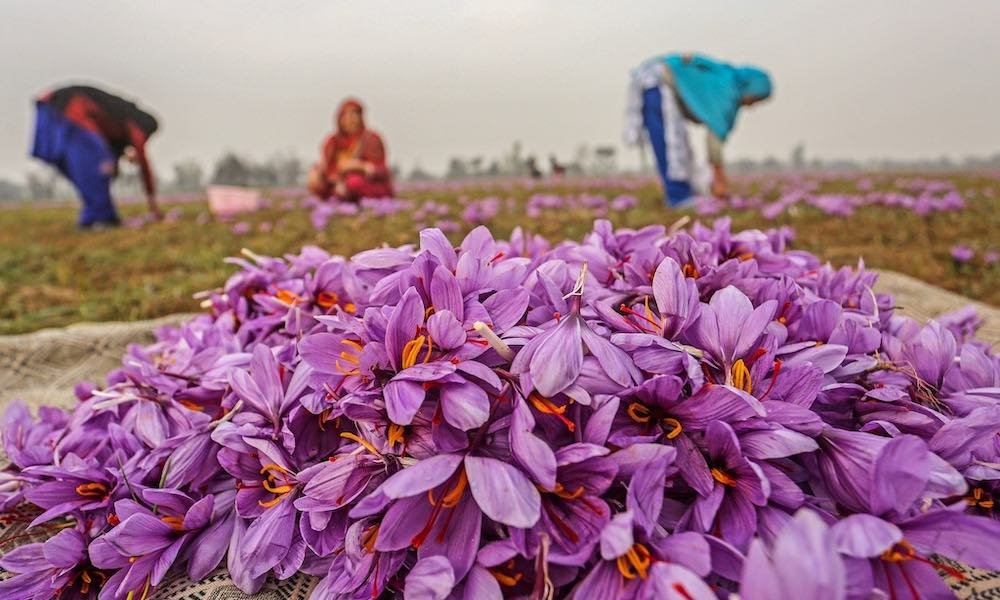
Athar Ayoub
Dhaar Mehak M
Saffron industry in Kashmir
One of the oldest and yielding family occupations prevalent in the valley of Kashmir has been the cultivation of Saffron. The karewas of Pampore are internationally known for the quality and quantity of saffron across the world. Through the ups and downs of time and periods of natural and man-prompted disasters, this sector has been quietly yielding a stable and rather steadily growing output over the period of time. Generations after generation have been associated with the cultivation and rearing of saffron. People across the binary gender, residing predominantly in the Pampore area have been habitually and evolutionarily working in this sector.
On the technical side, though India ranks second only after Iran in terms of productivity of cultivation in Saffron it ranks seven. This points to the existence of huge inefficiency in the saffron production of the country. For years at a stretch, there has been under-production happening in the saffron production of the country. More than 90% of India’s saffron cultivation comes from Kashmir, estimated to be around 15.04 metric tonnes (MT) for the year 2021. However, for the last fifty years, there has been a considerable decline in both the cultivable land and the overall Saffron productivity in the valley of Kashmir. While in the year 2009, the total area under cultivation for Saffron was 2667 hectares with a production of 5.61 tonnes, almost a decade earlier in 1997 it was 5707 hectares and 15.97 tonnes respectively. These numbers highlight a decline of 114% in area and 184% in yield in a time period as short in span as 12 years.
For years at a stretch, there has been under-production happening in the saffron production of the country. More than 90% of India’s saffron cultivation comes from Kashmir, estimated to be around 15.04 metric tonnes (MT) for the year 2021. However, for the last fifty years, there has been a considerable decline in both the cultivable land and the overall Saffron productivity in the valley of Kashmir. While in the year 2009, the total area under cultivation for Saffron was 2667 hectares with a production of 5.61 tonnes, almost a decade earlier in 1997 it was 5707 hectares and 15.97 tonnes respectively. These numbers highlight a decline of 114% in area and 184% in yield in a time period as short in span as 12 years.
Results like these are an outcome of a number of factors that have cumulated over the years. Some of the most commonly identified factors include; lack of availability of good-quality corms as seed material, poor soil fertility, lack of assured irrigation, infestation by rodents and diseases, poor postharvest management, improper marketing facilities, increased urbanization on saffron land, the helplessness of the Government in checking adulteration and clandestine smuggling of cheap saffron (allegedly from Iran), which is later sold and marketed in the name of Kashmir saffron.


The saffron growers reveal that in contemporary times the causes of less productivity across the Kashmir region are: climate change, non-availability of timely irrigation and information asymmetry between those framing the policies for the farmers and the farmers themselves. Though the government has been initiating measures to revamp the damage, the Saffron cultivators conclude that almost 60% of the land under which saffron is cultivated was brought under a pipeline network scheduled to irrigate the land. However, in practice, the project has been full of flaws and thus ended up failing miserably. Leaving the land yet again to the mercy of timely and untimely rains. The saffron growers in the first place lack scientific knowledge, do not have access to modern know-how and technology and at the same time lack all sorts of trust over the government. One such typical example is the sale of hybrid saffron corms that the government announced some years ago. Given the mistrust between the people and the government, it was rumoured that the sowing of the hybrid saffron corm distributed by the department of agriculture will transfer the private property rights of the owners to the government. As a result, the vast majority of saffron cultivators didn’t take those corms and the productivity and output ended up remaining under-attained.
Whatever interventions the government and administration intend to make, the campaign of enhancing the productivity of saffron would not bear the desired results unless for starters a certain level of trust is established between the saffron cultivators and the government. Following this, facilities for assured irrigation need to be created, at least at the pre-sprouting and pre-flowering stages. Irrigation facilitates lead quick activation of buds, further leading to the corm sprouting and the eventual timely flower initiation. An empirical study by Nehvi (2004), and Nehvi and Makhdoomi (2007b) bring forth the fact that an annual saffron crop requires an average of 10 irrigations, and needs to be sprinkler irrigated for seven days at the sprouting stage (which is approximately around 25th August to 15th September) followed by three irrigations at the post-flowering stage (around 8th to 30th November) at weekly intervals.
In a recent and rather unusual move, the Government of India initiated a National Saffron Mission (year) with a financial outlay of Rs 3.74 billion for resolving the saffron crisis in Kashmir through different programmes. This program includes rejuvenating saffron farms by corm re-planting, digging bore wells for irrigation, and setting up a modern Saffron Park with a quality control laboratory for providing adequate marketing cover to saffron growers, thus eliminating exploitation by middlemen. However, from the ground, there are mixed reactions and opinions coming from the farmers about the initiation and implementation of the mission. The actual attained outcome from this mission and its various programs is yet to be ascertained for success or failure. Saffron Industry in Kashmir.
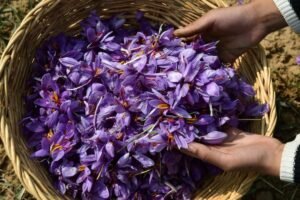

Case-Study
“The JK Agro” is a registered saffron firm which has been gainfully employing generations of the Khanday family from Pampore. It has been around six years since the third generation has overtaken the business. The upcoming generations from the saffron families have been trying to expand and diversify the business. One of the most common channels has been through proper marketing, e-marketing and processing of the saffron and allied products. JK Agro, in an attempt to expand, has been making huge investments. But the major hurdle faced by it in attaining the expected growth has been the declining productivity of output. As a result, the younger generation of small and medium-scale saffron farmers have steadily been moving out from the industry and instead looking for other sources of employment. However, families like Khanday’s are of the opinion that complete dependency on saffron might not be enough to fulfil their subsistence needs and hence are trying hard to find jobs distant from their ancestral domain…
Given the various facets discussed above, the broader conclusion drawn is that the decline in the cultivable land and productivity of saffron in Kashmir is the basic reason behind the ever-increasing crisis in the heritage-saffron industry of Kashmir. The most appropriate channel to win back the industry and the people associated with it is to stake strict actions towards the restoration of the karewas land and to scientifically enhance the overall productivity of the saffron in the Kashmir region.
The authors are affiliated with the Department of Economics, Islamic University of Science and Technology and can be reached at dhaarmehak@gamil.com
You may like
-




RBI penalises Central Cooperative Banks Baramulla, Anantnag for violations
-




Editorial | J&K Budget 2025-26 – A Balancing Act
-




Building FPO Leaders: SKUAST-K, MANAGE Hyderabad complete trainers’ training
-




CII J&K Organizes Health Conclave 2024
-

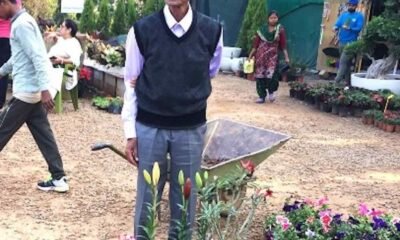


Kya kuchh tha jiske kehne ko: A tribute to father
-

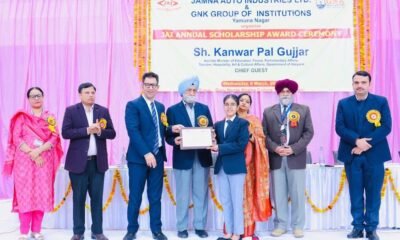


GNK hosts JAI scholarship distribution function
AgriBiz
Building FPO Leaders: SKUAST-K, MANAGE Hyderabad complete trainers’ training
Published
5 months agoon
November 30, 2024By
BK Editor

BK News
Srinagar: The month-long Training of Trainers (ToT) program for Farmer Producer Organizations (FPOs), organised by Sher-e-Kashmir University of Agricultural Sciences and Technology of Kashmir (SKUAST-K) and Agriculture Department in collaboration with the National Institute of Agricultural Extension Management (MANAGE), Hyderabad, concluded successfully, marking a major milestone in capacity building for agricultural transformation in Jammu and Kashmir.
The program brought together some of India’s foremost agricultural business experts to train nearly 300 resource persons in eight batches. Designed under SKUAST-K’s HADP Project 20: Innovative Approaches for Promoting Agriculture in J&K, the initiative aimed to strengthen farmer organizations such as FPOs, Self-Help Groups (SHGs), Common Interest Groups (CIGs), and Primary Agricultural Credit Societies (PACS). The program covered topics like FPO formation, business planning, supply chain management, and market linkages.


Vice-Chancellor SKUAST-K, Prof Nazir Ahmad Ganai, who actively monitored the program, in his message stressed the importance of FPOs in transitioning J&K from subsistence farming to sustainable commercial agriculture. Drawing comparisons with advanced economies, he highlighted the urgent need to increase agricultural processing, which currently stands at just 2% in the region.
Prof Masood Saleem Mir, Associate Director Research and Principal Investigator of the HADP Innovative Extension Project, elaborated on the program’s objectives and logistics. “This training was designed to address the unique challenges faced by farmer organizations in J&K. By equipping participants with technical, managerial, and entrepreneurial skills, we aim to create a ripple effect where these trainers will mentor and guide farmers across the region,” he said. Prof Mir further highlighted the strategic collaboration with MANAGE Hyderabad and the Agriculture Production Department, which ensured the program’s success.
“Our aim is not just to train individuals but to build a system where farmers can access consistent support and practical solutions for their challenges. The comprehensive curriculum, covering everything from FPO formation to business sustainability, is tailored to meet the region’s specific needs,” Prof. Mir added.
The training, facilitated by MANAGE Hyderabad, featured country’s top expert in FPO formation, business planning and supply chain management. These experts provided strategic insights into FPO management, business sustainability, and innovative mobilization techniques, ensuring practical outcomes for the participants.
Participants praised the program for its practical orientation, stating that it had demystified the complexities of building successful FPOs. Many called for follow-up sessions focused on developing tailored, commodity-based business plans to enhance FPO effectiveness.
This initiative aligns with SKUAST-K’s vision to make J&K a model bioeconomy in the country, fostering a resilient and sustainable agricultural landscape. The university plans to replicate the program in the Jammu division, further extending its impact.
The event concluded with the distribution of certificates to the trainees and a pledge by all stakeholders to work collectively towards uplifting the region’s farming community.
AgriBiz
SKUAST-K innovator clinches Rs5lakh RKVY Raftaar grant
Published
1 year agoon
January 9, 2024By
BK Editor

BK News
Srinagar: An innovator from Sher-e-Kashmir University of Agricultural Sciences and Technology of Kashmir, Shaista Khan, has bagged Rs5lakh RKVY Raftaar grant for Herbodyne, an herbal toothpaste based on an indigenous Kashmir plant.
Presently pursuing PhD from the SKUAST-K’s Faculty of Forestry, Benhama campus has been awarded the grant under RKVY RAFTAAR, MANAGE, Hyderabad from Ministry of Agriculture and Farmer’s Welfare, Govt. of India. She was mentored by Prof TH Masoodi, Registrar SKUAST-K, Prof Imtiyaz Murtaza, Division of Basic Sciences and Humanities, Prof Parvez Ahmad Sofi, Prof. and Head, Div of FPU and Dr Nazir Ahmad Pala, Div of Silviculture and Agroforestry, Faculty of Forestry.
On talking to her, Shaista Khan says that it happened only due to the mentorship and support that she received from the mentors and the Faculty of Forestry, SKUAST-K. She expresses heartfelt gratitude to Prof Nazir Ahmad Ganai, VC SKUAST-K and Prof. T.H. Masoodi, Registrar SKUAST-K for providing an inspirational, motivational and unwavering support system. She also expresses her sincere thanks to her mentors Prof. T. H. Masoodi Registrar, SKUAST-K, Prof Imtiyaz Murtaza, Prof. Parvez A Sofi and Dr Nazir A Pala for their effective mentorship and for inspiring her with this innovative idea. She is also grateful to Dr Akhlaq Amin Wani, Prof.& Head, Div. of Natural Resource Management, Dr JA Mugloo, Head, KVK, Malangpora and Dr GM Bhat, Prof & Head, Silviculture and Agroforestry and other members of the faculty for their valuable support and encouragement. In addition, she says that she is very thankful to the NAHEP, SKUAST for providing financial assistance and SKIIE, SKUAST-K for their support and guidance.
AgriBiz
Vegetable Science: A Potential Area for Startups in J&K
Published
1 year agoon
December 14, 2023By
BK Editor



Dr Asima Amin Dr Baseerat Afroza Naveed Hamid
In a world grappling with the challenges of population growth, environmental sustainability, and a shifting focus towards healthier lifestyles, the potential of vegetable science in startups emerges as a beacon of transformative innovation. The intersection of agriculture, technology, and health has given rise to a myriad of opportunities for entrepreneurs to revolutionize the way we cultivate, consume, and benefit from vegetables.
As global consciousness veers towards sustainable practices and healthier food choices, startups delving into vegetable science are poised to play a pivotal role in shaping the future of our food systems. This introduction seeks to explore the diverse avenues where startups can harness the power of vegetable science to address pressing issues such as food security, nutritional health, and environmental impact.
From leveraging cutting-edge technologies in agriculture to developing novel plant-based food products, the potential applications of vegetable science are vast and impactful. This exploration encompasses not only the traditional aspects of farming and crop management but also delves into the realms of biotechnology, food technology and sustainable business practices.
We will delve into specific domains where startups can thrive, exploring how innovation in vegetable science can drive change in agribusiness, food technology, health and wellness, sustainability, and more. The goal is to unveil the untapped potential that lies within the realm of vegetable science, inspiring entrepreneurs, investors, and stakeholders to contribute to a more sustainable, nutritious, and equitable future.
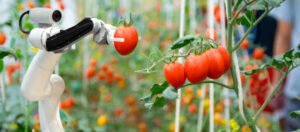

As we embark on this journey through the fertile landscape of vegetable science in startups, envision a world where the humble vegetable becomes a catalyst for transformative change, not only in our diets but in the very fabric of how we approach agriculture, technology, and the well-being of our planet.
STARTUP AREAS
Vegetable science can play a significant role in startups across various sectors, ranging from agriculture and food technology to health and sustainability. Here are some potential areas where vegetable science can contribute to startup innovations:
-
Ag-Tech Startups:
- Precision Farming: Utilize technology, sensors and data analytics to optimize vegetable cultivation, ensuring efficient resource use and higher yields.
- Vertical Farming: Develop indoor farming solutions using controlled environments, allowing year-round vegetable production in urban areas.
- Biotechnology: Explore genetic modification and breeding techniques to enhance the nutritional content, disease resistance,and overall quality of vegetables.
-
Food Technology:
- Plant-Based Alternatives: Create innovative plant-based products using vegetables to meet the growing demand for vegetarian and vegan options.
- Food Preservation: Develop technologies for extending the shelf life of vegetables, reducing food waste, and ensuring freshness during transportation.
- Nutritional Enhancement: Explore methods to fortify vegetables with additional nutrients to address specific health concerns.
-
Health and Wellness:
- Functional Foods: Develop vegetable-based products with specific health benefits, such as anti-inflammatory, antioxidant or immune-boosting properties.
- Nutraceuticals: Investigate the medicinal properties of vegetables and create supplements or health products based on their natural compounds.
-
Sustainability:
- Circular Economy: Implement sustainable practices in vegetable production, such as recycling agricultural waste, utilizing organic fertilizers, and adopting eco-friendly packaging.
- Zero-Waste Solutions: Develop technologies to utilize every part of vegetables, minimizing waste and creating by-products for various applications.
-
Smart Farming and IoT:
- Smart Sensors: Integrate sensors to monitor soil conditions, water levels, and plant health, allowing farmers to make data-driven decisions for optimized crop management.
- IoT in Supply Chain: Implement IoT technologies to track and monitor vegetables throughout the supply chain, ensuring quality, reducing losses, and enhancing traceability.
-
Education and Consulting:
- Agribusiness Consulting: Startups can provide consultancy services to farmers on adopting modern vegetable cultivation techniques, sustainable practices, and technology integration.
- Educational Platforms: Develop online platforms to educate farmers, entrepreneurs, and consumers about the latest advancements in vegetable science, sustainable agriculture, and healthy eating.
-
Community and Social Impact:
- Community Gardens: Startups can facilitate community-based vegetable gardens, promoting local produce, community engagement, and sustainable agriculture practices.
- Social Enterprises: Combine vegetable science with social impact by addressing issues like food insecurity, promoting fair trade, and supporting local farmers.
IMPACT OF STARTUPS IN VEGETABLE SCIENCE
The potential of vegetable science in startups offers a range of benefits that extend beyond economic success. These ventures can positively impact various sectors and address pressing global challenges. Here are some key benefits:
-
Sustainable Agriculture:
- Resource Efficiency: Startups can develop technologies and practices that optimize resource use, such as water, fertilizers, and land, contributing to sustainable and environmentally friendly agriculture.
- Reduced Environmental Impact: By promoting organic farming, minimizing chemical pesticide use, and adopting eco-friendly practices, vegetable science startups can contribute to reducing the environmental footprint of agriculture.
-
Innovation in Crop Management:
- Increased Yields: Precision farming technologies and genetic modifications can lead to higher crop yields, addressing the growing demand for food in a world with an expanding population.
- Disease Resistance: Genetic modifications can enhance the resistance of vegetables to pests and diseases, reducing the reliance on chemical pesticides and promoting healthier crops.
-
Health and Nutrition:
- Improved Nutritional Content: Biotechnological advancements can be harnessed to enhance the nutritional content of vegetables, providing consumers with healthier and more nutrient-rich food options.
- Functional Foods: Startups focusing on functional foods can contribute to improved public health by developing vegetable-based products with specific health benefits.
-
Economic Opportunities:
- Job Creation: The growth of vegetable science startups can lead to job creation across various sectors, including agriculture, technology, research, and product development.
- Market Expansion: Innovations in vegetable-based products can open up new markets and cater to the increasing demand for sustainable and plant-based alternatives.
-
Food Security and Accessibility:
- Year-Round Production: Vertical farming and controlled environment agriculture enable year-round vegetable production, reducing dependence on seasonal harvests and improving food security.
- Localized Farming: Community-based initiatives and startups focused on local farming contribute to localized food production, reducing the need for extensive transportation and storage.
-
Technological Advancements:
- Smart Farming: Integration of technology in agriculture, such as smart sensors and IoT devices, leads to more efficient and data-driven farming practices, improving overall productivity.
- Traceability and Transparency: Technologies for supply chain traceability enhance transparency in the food production process, building consumer trust and meeting the demand for ethically sourced products.
-
Community Engagement and Social Impact:
- Community Empowerment: Initiatives like community gardens and social enterprises create opportunities for community engagement, fostering a sense of empowerment and ownership among local populations.
- Addressing Food Insecurity: Socially focused startups can play a role in addressing food insecurity by promoting sustainable and affordable vegetable production methods.
-
Education and Awareness:
- Knowledge Dissemination: Educational platforms and consulting services contribute to disseminating knowledge about sustainable agriculture practices, technology adoption, and healthy eating habits.
- Empowering Farmers: Agribusiness consulting services empower farmers with the knowledge and tools to adopt modern practices, improving their livelihoods and the sustainability of their operations.
Conclusion
The potential of vegetable science in startups holds tremendous promise and presents exciting opportunities for innovation, sustainability, and societal impact. As the world grapples with challenges such as food security, environmental sustainability, and public health, leveraging the power of vegetable science can pave the way for transformative solutions.
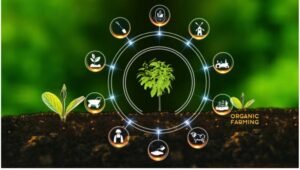

Startups focusing on vegetable science can contribute significantly to agricultural advancements by developing resilient and high-yielding vegetable varieties through breeding techniques, genetic engineering and precision agriculture. This not only addresses global food demand but also aids in the conservation of resources, reduction of environmental impact, and mitigation of climate change.
Furthermore, the integration of cutting-edge technologies, such as artificial intelligence, robotics, and data analytics, into vegetable science can enhance crop monitoring, optimize resource utilization, and streamline supply chain processes. This not only increases efficiency but also opens new avenues for automation and smart farming practices.
The nutritional value of vegetables also plays a crucial role in promoting public health and wellness. Startups can explore innovative approaches to enhance the nutritional content of vegetables, develop functional foods, or create new plant-based products to meet the growing demand for healthy and sustainable diets.
Moreover, the rise of alternative protein sources, including plant-based proteins derived from vegetables, presents a unique opportunity for startups to contribute to the burgeoning market of sustainable protein options. By developing novel processing techniques and improving the taste and texture of plant-based products, these startups can cater to the increasing consumer preference for environmentally friendly and ethical food choices.
In Nutshell, the convergence of vegetable science, technology, and entrepreneurship holds the potential to revolutionize the agriculture and food industry. Startups that embrace this intersection can not only drive economic growth but also make significant contributions to addressing some of the most pressing challenges facing our planet. As the world continues to recognize the importance of sustainable and nutritious food systems, vegetable science startups stand at the forefront of creating a more resilient, efficient, and healthier future for all.
SKUAST K under the ambit of SKUAST K Innovation, Incubation & Entrepreneurship Centre is always ready to support new young minds or budding entrepreneurs who wish to start their enterprises or have some novel or great ideas to take it forward to convert them into minimum viable products or technologies in vegetable science field can come and take advantage of this Centre situated in SKUAST K main campus Shalimar.
The authors are faculty at SKUAST-K



RBI penalises Central Cooperative Banks Baramulla, Anantnag for violations



Editorial | J&K Budget 2025-26 – A Balancing Act


Building FPO Leaders: SKUAST-K, MANAGE Hyderabad complete trainers’ training


CII J&K Organizes Health Conclave 2024


SKUAST-K to hold mega Science Summit on Aug 23-24


Haryana Biodiversity Board commemorates International Biodiversity Day at GNK Group Of Institutions


Kya kuchh tha jiske kehne ko: A tribute to father


GNK hosts JAI scholarship distribution function


Administrative Council approves J&K Startup Policy 2024-27


How to begin investing



Editorial | J&K Budget 2025-26 – A Balancing Act



RBI penalises Central Cooperative Banks Baramulla, Anantnag for violations
Trending
-

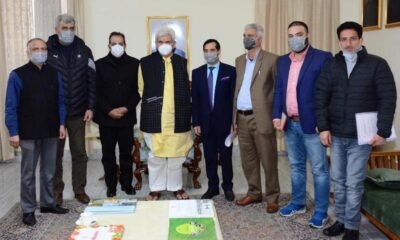

 Industry4 years ago
Industry4 years agoFCIK hails LG Sinha for creating entrepreneur-friendly industrial ecosystem
-



 Economy2 years ago
Economy2 years agoGlobal eCommerce boom and local traders of Kashmir
-

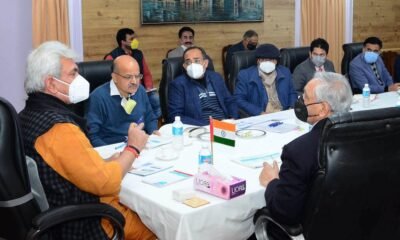

 Energy4 years ago
Energy4 years agoLt Governor discusses J&K power scenario with experts
-

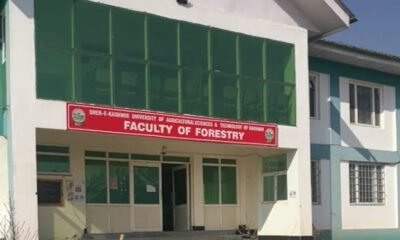

 Infra4 years ago
Infra4 years agoSKUAST-K bags EU project for urban green infrastructure
-

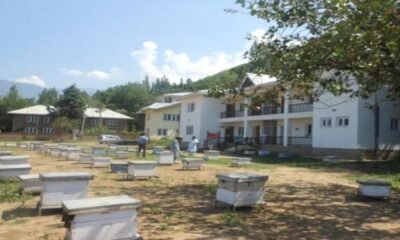

 AgriBiz4 years ago
AgriBiz4 years agoSKUAST-K to set up 3 honey testing labs in Kashmir
-



 Jobs4 years ago
Jobs4 years agoJ&K Govt holds Industry Connect Meet-Himayat 2020
-

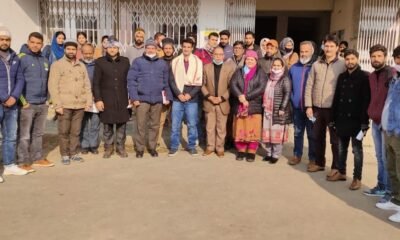

 Careers4 years ago
Careers4 years agoSKUAST-K holds career counselling at Wadura campus
-



 Industry4 years ago
Industry4 years agoImran Murtaza takes oath as president Industrial Association Khunmoh

